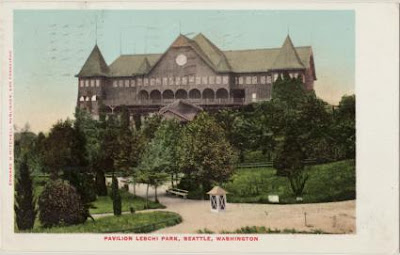Seattle was a bustling, bumptious, fast-growing place during the first decade of the 20th century, and many of the events and locations of that era are worthy of commemoration. Sousa (along with Henry Fillmore, Carl King and a number of others) wrote marches that were some of the most popular tunes of the day, so the band is a perfect fit for a musical look back.
Two years ago the band played for centennial celebrations for the Pike Place Market. (That is the proper name for the Market, and if I hear one more person talk about "Going to Pike's Market" I will say something intemperate, even if I AM on a bus.)
The band also played that year for the 100th anniversary of the Good Shepherd Center, which started life as a home for wayward girls and now serves as a busy community center (and the band's practice space.)

This year's big event is the commemoration of the Alaska-Yukon-Pacific Exposition, which took place 100 years ago on the site now occupied by the University of Washington. (More information here.)
In July, the band helped welcome a group of vintage cars (Model T's, mostly) re-creating a cross-country race that was part of the original AYP festivities. Among the tunes that day was a march written especially for the exposition (Washington State's very first World's Fair.) It was appropriately titled "From Alaska to Panama," but written by an eccentric composer from Pennsylvania who probably never set foot in the Northwest.
Yesterday a beautiful lakefront park celebrated its 100th year. Although the casino, shown in the picture, is long gone, Leschi Park still occupies choice acreage on the shores of Lake Washington. In 1909 people reached the park on a cable car, and in 2009 you can still get there - easily - by public transportation (one change of buses from my house to the park.)

The band played for an hour, entertaining a good crowd, coping successfully with a stage set on ground that sloped slightly backward. (That had to be the reason the Sedentary Majorette accidentally tossed her baton among the clarinets.)

No comments:
Post a Comment